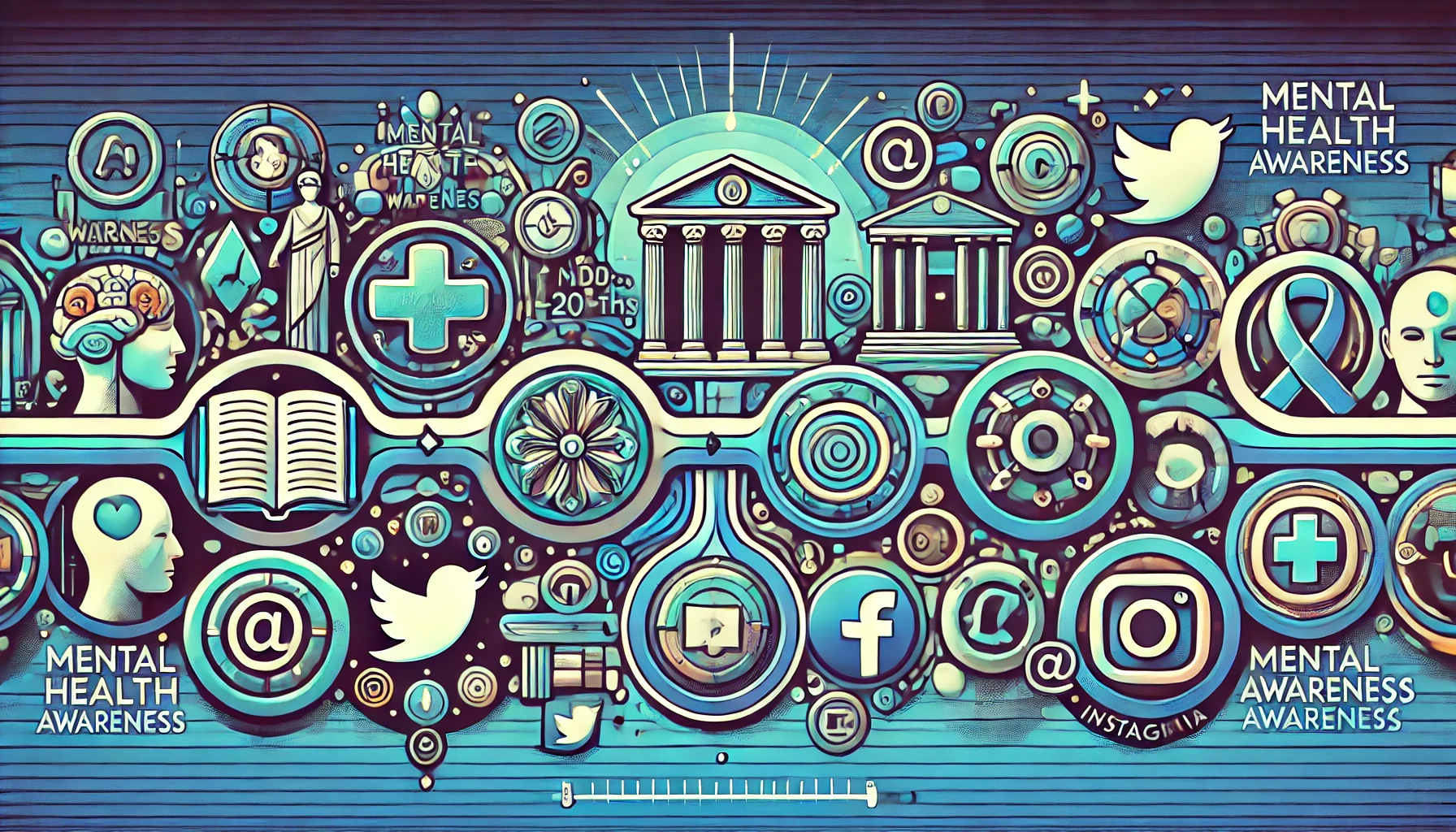The Evolution of Mental Health and Social Media’s Role
Explore the historical journey of mental health awareness and the transformative impact of social media in amplifying its importance across modern society.
Table of Contents
Introduction
In today’s world, mental health is no longer a topic whispered about behind closed doors—it’s front and center, especially online. What used to be seen as a strictly personal matter has now found its way into the public sphere, amplified by social media. Yet, while conversations around mental health have increased, there’s still a widespread misunderstanding of mental illness as a spectrum, particularly in online behavior.
A Historical Look at Mental Health as a Spectrum
Mental health as we understand it today didn’t emerge overnight. Ancient civilizations, such as the Greeks and Egyptians, had their own theories on behavior and illness, often attributing mental distress to the gods or spirits. Fast forward to the late 19th and early 20th centuries, and psychiatry as a field began to emerge, marked by pioneers like Sigmund Freud and Emil Kraepelin. However, mental illness was still mostly seen as binary—you were either “normal” or “abnormal,” with no recognition of the subtleties in between.
It wasn’t until the mid-20th century that psychologists and psychiatrists began pushing back against this black-and-white view. The introduction of the DSM-III (Diagnostic and Statistical Manual of Mental Disorders) in 1980 marked a pivotal moment. By categorizing mental health conditions along a spectrum, the DSM allowed for a broader understanding that mental health could exist in varying degrees of severity and impact. This was a breakthrough that reframed the idea of mental illness and paved the way for further exploration.
In the 1990s, researchers like Aaron Beck and Marsha Linehan expanded the spectrum concept with treatments for mood disorders and borderline personality disorder, respectively, promoting the idea that mental health conditions could ebb and flow over time and with different levels of intensity. This idea of a spectrum was revolutionary, but it didn’t gain full traction in the public eye until social media came into play.
When Online Behavior Reflects Mental Health
Social media’s unique ability to mask identity and amplify emotion led to the emergence of a specific kind of online behavior—one marked by impulsivity, aggression, and sometimes even cruelty. Psychologists began to question whether these behaviors were symptomatic of deeper mental health issues rather than mere hostility or rudeness.
For example, Twitter conducted a study in 2019 that found people were more likely to engage in hostile language when discussing divisive topics. This observation sparked discussions about whether online aggression was a symptom of mental distress, manifesting as defensive or impulsive responses to stress or anxiety. Other studies suggested that behaviors like “trolling” might be linked to underlying mental health challenges, including mood disorders, anxiety, or even unresolved trauma.
It was around this time that advocates like Dr. Jessica Clemons, a psychiatrist and social media influencer, began using her platform to talk about mental health in a nuanced way. Clemons argued that behaviors like anger, impulsivity, and even hostility could often be clues to an underlying struggle rather than purely negative traits. According to Clemons, mental health should be seen as a spectrum—a perspective that allows for the understanding that not all mental health struggles meet clinical thresholds but can still significantly impact behavior.
Stigma and Quick Judgment in the Digital Age
Despite increased awareness, mental health stigma remains a significant issue. Social media often fuels quick, judgmental reactions. When a public figure, for example, makes an impulsive or insensitive comment online, they’re typically met with intense backlash rather than empathy. A case in point was YouTuber Logan Paul in 2018. After posting an insensitive video filmed in Japan’s Aokigahara Forest, also known as the “Suicide Forest,” Paul faced widespread criticism, much of which focused on his character rather than potential underlying mental health issues or the social pressures that influence online behavior.
Psychologists noted that the backlash was emblematic of a broader social issue—the tendency to frame impulsive or inappropriate behavior through a moral lens. This kind of framing often ignores the mental health factors that might have influenced such actions. While not excusing behavior, mental health advocates argued for a more empathetic approach, suggesting that understanding the spectrum of mental illness could foster compassion and reduce the tendency to criminalize or villainize impulsive behavior.
In a 2020 study by Pew Research Center, researchers found that 66% of Americans felt “worn out” by the political content on social media, a symptom of what psychologists refer to as “emotional contagion.” This phenomenon describes how negative emotions can spread like a virus through online interactions, influencing individuals to act out in ways that are uncharacteristic of their real-life behavior.
A Shift Towards Empathy and Education
In response to these challenges, social media companies have taken small steps to address the connection between mental health and online behavior. For instance, Twitter introduced prompts in 2020 to encourage users to rethink their responses before posting. Similarly, Instagram implemented mental health resources for users experiencing distress, aiming to foster a supportive environment rather than a punitive one.
Despite these efforts, mental health advocates continue to call for more systemic changes. Some argue that a mental health spectrum approach can help individuals understand behaviors that may otherwise seem extreme or unreasonable. Rather than assuming a person is simply “mean” or “unhinged,” understanding mental health as a spectrum can encourage people to pause, empathize, and recognize the potential distress or struggles behind online behavior.
Advocates like Dr. Clemons believe that educating the public on these nuances can prevent stigma and promote a culture of empathy. “Mental health is complex, and it affects all of us,” she noted in a 2021 interview with Psychology Today. “By embracing a spectrum-based view, we can see people’s actions in a new light and recognize that the internet sometimes magnifies struggles that go unaddressed in real life.”
The Balance of Understanding and Accountability
While many advocates call for a more compassionate approach, some worry that this spectrum-based view might be misused as a free pass for harmful behavior. Mental health educators like Dr. Paul Applebaum, a professor of psychiatry at Columbia University, argue that while understanding is crucial, it shouldn’t eliminate accountability. According to Applebaum, the challenge is finding a balance that acknowledges mental health as a factor while still holding individuals responsible for harmful actions.
Social media discussions around mental health have become more nuanced, often centered on the hashtags #MentalHealthAwareness, #EndTheStigma, and #MentalHealthSpectrum. These online communities aim to reshape conversations around mental health by reminding people that behavior can be multifaceted. However, it’s a delicate line—promoting understanding without excusing accountability.
Part 1 Summary
In this expanded first part, we traced the evolution of mental health understanding from ancient history through the mid-20th century, emphasizing the shift to a spectrum-based view. We examined social media’s role in amplifying impulsive behavior, often leading to stigma and moral judgment. By looking at real-world cases and current advocacy efforts, we see the challenge of balancing empathy with accountability—a theme that will continue in Part 2, as we delve deeper into high-profile instances and the complex societal implications.
References
-
The Evolution of Mental Health Care by National Center for Biotechnology Information
An academic perspective on the historical progression of mental health care. NCBI
-
Social Media and Mental Health: Benefits, Risks, and Opportunities for Research and Practice by SpringerLink
Insights into the role of social media in mental health advocacy. Springer
-
The Importance of Mental Health Awareness by Psychology Today
A detailed discussion on why mental health awareness is essential in society. Psychology Today


The Social Media Catalyst
When Twitter launched in 2006, few could have anticipated the profound effect it would have on communication. Initially celebrated as a space for sharing ideas, Twitter and other platforms quickly became venues for raw, unfiltered emotion. With the rise of Instagram, Facebook, and eventually TikTok, users became accustomed to a form of public performance where reactions, likes, and shares dictated behavior.
The connection between social media and mental health soon became a subject of research. By 2015, psychologists had started to note a correlation between social media usage and mental health challenges, particularly among younger users. Dr. Jean Twenge, a psychologist and researcher, explored this connection in her 2017 book, iGen, which highlighted the impact of social media on anxiety and depression rates in teenagers. With social media fueling comparisons and reinforcing impulsive behavior, there was a growing recognition that the platforms themselves were influencing mental health.